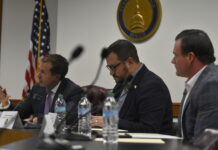
WASHINGTON (GA Recorder) — The U.S. House elected Kevin McCarthy speaker early Saturday after most of the chamber’s Republicans finally gathered behind him, ending a four-day stalemate that led to the most rounds of voting for a speaker since before the Civil War.
The California Republican was able to clinch the gavel on the 15th ballot by turning many of the 20 conservative GOP lawmakers who voted against him to his side through a combination of rules changes and promises that his leadership will be different from recent House GOP speakers.
McCarthy received 216 votes to 212 for Democrat Hakeem Jeffries of New York, with six Republican members voting present.
The agreement and the vote allowed the 434 current members of the chamber to be sworn in for the 118th Congress and will allow other essential steps for the House, like adopting the rules, officially forming committees, and passing bills to move forward.
McCarthy’s campaign to become the nation’s 55th speaker ran into a significant roadblock Friday just before midnight on the 14th ballot. Verbal disputes among Republicans that nearly turned physical broke out on the floor when McCarthy fell just short of gaining enough votes.
Tensions surrounding McCarthy’s efforts to clinch the gavel he’s been working towards for years led to a chaotic scene in the chamber as the California Republican walked from his seat to where Lauren Boebert of Colorado and Matt Gaetz of Florida were seated.
The two dissenters had voted present, in what originally seemed like a goodwill gesture to help lower the threshold of votes McCarthy needed to become speaker without the two having to actually vote for him.
McCarthy and Gaetz appeared to disagree strongly, yelling at each other as North Carolina’s Patrick McHenry tried to intercede to cool tensions and work toward getting McCarthy elected, as he has been for days.
North Carolina’s Richard Hudson had to hold back Alabama’s Mike Rogers from possibly getting into a physical altercation with Gaetz in a tumultuous moment for the House Republican Conference, which has been in charge of the chamber since just Tuesday.

McHenry then called for the House to adjourn until Monday at noon. Republicans initially voted for adjournment, only switching their votes at the last seconds when McCarthy cheerfully led them in moving to stay in session for the 15th and last ballot.
The last of the Republican holdouts — Andy Biggs of Arizona, Eli Crane of Arizona, Bob Good of Virginia, and Matt Rosendale of Montana — voted present on the final ballot, lowering the threshold McCarthy needed to become speaker but not actually giving him their full support. Boebert and Gaetz also voted present on the last ballot.
Concessions to conservatives
McCarthy has made several concessions to the more conservative members of his party, many of them members of the House Freedom Caucus, including a change to the motion to vacate that will allow any one member to essentially call for a no-confidence vote on the speaker.
McCarthy also promised to cut spending, though he would need to broker a deal with the Democratic Senate and the Biden administration for that to actually happen.
The nominating speech for McCarthy on the 14th ballot came from McHenry, who is slated to become chairman of the powerful House Financial Services Committee.
“I’m one of the few members left on the Republican side who has had the pleasure of serving with Kevin for the entirety of his tenure in the House,” McHenry said. “He’s unflinchingly optimistic; the glass is always half full. That’s been a hell of a trait, especially this week. He’s relentless. The man does not quit.”
California’s Pete Aguilar, House Democrats’ caucus chair, sought to remind Republicans of the two-year anniversary of the Jan. 6 attack on the U.S. Capitol by pro-Trump rioters and the implications of GOP rule during a floor speech ahead of the 14th ballot vote.
“Today, we adjourned amidst utter confusion. Only this time, we’re returning in the dark of night — not to cast a vote to bring this country together and to do our jobs, but one that will set the path toward division and default,” Aguilar said before the vote.
Dan Bishop of North Carolina, Josh Brecheen of Oklahoma, Michael Cloud of Texas, Andrew Clyde of Georgia, Byron Donalds of Florida, Paul Gosar of Arizona, Anna Paulina Luna of Florida, Mary Miller of Illinois, Ralph Norman of South Carolina, Andy Ogles of Tennessee, Scott Perry of Pennsylvania, Chip Roy of Texas, Keith Self of Texas and Victoria Spartz of Indiana all moved to backing McCarthy on the 12th ballot.
Spartz previously had been voting present in an effort to get the holdouts in a room to work out a deal.
Maryland’s Andy Harris then flipped his vote to McCarthy on the 13th ballot.
“If the agreement we were able to finalize over the last few days is implemented, it will be the greatest change in how the House operates and becomes much more responsive to the American people in at least two generations,” Harris said in a written statement following his changed vote.
Biggs, Crane, Good, and Rosendale voted against McCarthy on the 14th ballot, but all switched to present votes, along with Boebert and Good, on the 15th ballot.
Perry and the House Freedom Caucus members who shifted their support to McCarthy said the deal under negotiation will hold the speaker accountable, curb spending and allow for more conservative representation on committees.
“It is critically important that the Rules Committee reflects the body and reflects the will of the people and that is a part of this framework,” Perry said.
Challenging outlook for House
The drawn-out speaker process highlights how challenging it will be for McCarthy to move legislation across the House floor with a four-person majority.
While many of the bills the House Republican Conference plans to move will be partisan and unlikely to get floor votes in the Democratic Senate, Congress has several must-pass bills that House GOP leaders will need to negotiate with Senate Democratic leadership and the Biden administration.
Those bills have been central to the ongoing dispute within the House GOP about how the party will handle its 222-person majority during this Congress.
The more conservative members of the party want to use the dozen annual government funding bills, which are supposed to become law by the start of the fiscal year on Oct. 1, to leverage GOP policy goals.
They’ve also touted the need to raise the nation’s debt limit sometime this year as another chance to hold up legislation in an effort to get some sort of agreement on how much the federal government spends annually.
The two deadlines and issues are separate, though some Republican lawmakers have switched them around or conflated them during interviews this week.
Congress has had several stalemates over government funding go past deadlines, leading to a funding lapse or a partial government shutdown. While the process has a significant impact on federal operations and the economy, it’s nowhere near as catastrophic as a default on the debt would be.
The United States has never defaulted on its debts and just getting close to the deadline in 2011 led to a downgrade of the nation’s credit.
Moody’s Analytics Chief Economist Mark Zandi and Assistant Director Bernard Yaros wrote in a September 2021 report released amid the last round of brinkmanship on the debt limit that a default on the debt would “upend” global financial markets and the economy.
They added that “even if resolved quickly, Americans would pay for this default for generations, as global investors would rightly believe that the federal government’s finances have been politicized and that a time may come when they would not be paid what they are owed when owed it.”
‘It will be difficult, no doubt’
Maryland Democratic Rep. Steny Hoyer, who is returning to the Appropriations Committee after stepping aside from leadership, said plans to bring the annual government funding bills to the floor under a process that will allow any member to offer amendments could become problematic for GOP leaders.
“Open rules don’t work because what you have is filibuster by amendment,” Hoyer said, noting that many of the amendments will be “gotcha amendments” and not substantive policy proposals.
Oklahoma’s Tom Cole said Friday night before the chamber met for the final round of votes that House Republicans can try to “encourage good behavior” so they don’t get 4,000-page bills, but can’t “impose our will on the Senate.”
“It will be difficult, no doubt. But this is the process. And I always tell people, remember, your first bill that’s passed is just simply your negotiating position,” Cole said. “But it’s going to change as it moves through the Senate. And the administration is certainly in a position to veto things, and you can veto things if you think they spend too little as well as if too much.”







